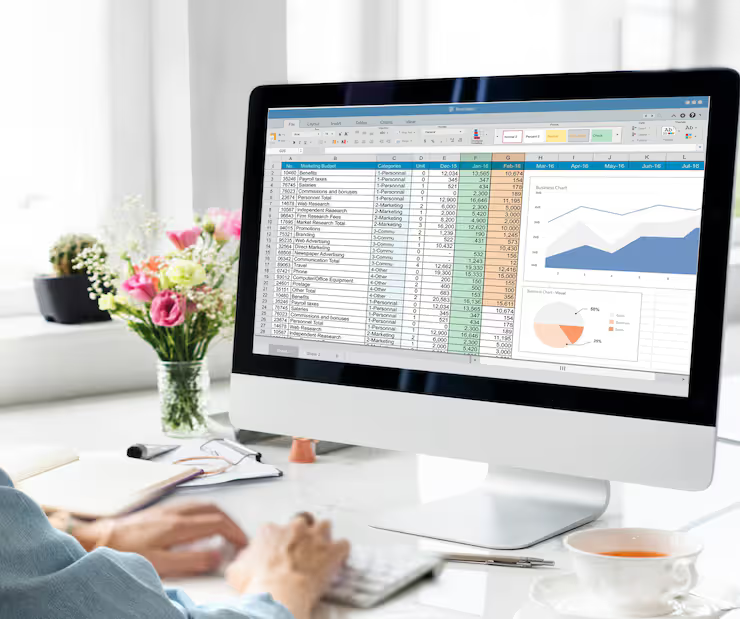Microsoft Excel has been one of the most widely used productivity units from decades. This is just more than a spreadsheet program - this is a platform for data management, analysis, visual and automation. From budget and commercial planning to academic research and project management, Excel provides an available way to handle structured information.
The existence comes from the need to arrange and calculate large amounts of data effectively. Over time, Excel has evolved in an advanced application from a basic number-chunching tool that supports cloud integration, collaboration and artificial intelligence functions.

Importance
Why is Excel so relevant today?
Universal application: Used in industry financing, health services, education, engineering, marketing and beyond.
Career Needs: Employers are often just as Excel as a key skill for jobs ranging from entry level assistant to data analysts.
Problem solving: Excel helps solve everyday challenges such as budget, project tracking, data visualization and trend forecasts.
Exhibition: Unlike special software, Excel Microsoft is part of the office and is available on most devices.
In today's data -interested world, Excel, by bridging a bridge between simple records and advanced analysis, are equally controlled individuals and businesses.
Newer updates
Excel continues, especially last year (2023-2024), with several remarkable updates:
Excel for web reforms: cloud -based Excel now now supports pivot tables, advanced mapping and macros, and closes the difference with the desktop version.
AI and automation: Microsoft 365 (2023) introduces users to generate formulas, summaries and visualizations with natural language signals.
Collaborative features: Co-description, version history and OneDrive/SharePoint integration in real time have made Excel more team friendly.
Computer connection: Improved power request tool supports several external data sources, making Excel a strong business intelligence tool.
Accessibility improvements: Supervisory support, improved keyboard shortcuts and interesting templates make Excel's more useful for everyone.
These updates indicate that Excel is no longer a standalone tool, but a large digital productivity is part of the ecosystem.
Laws or guidelines
While Excel is not directly regulated, the use in different areas can take in rules and guidelines:
Data Privacy Act: In areas such as the EU (GDPR) and America (HIPAA), the storage of sensitive personal information in Excel will follow privacy and security standards.
Business Management: Public companies should maintain accurate financial reporting; Excel is often part of these processes, and errors can lead to regulatory results.
Education standards: Many schools and universities integrate Excel into digital literacy programs supported by the government's education policy.
Exhibition regulation: Compliance with standards such as WCAG (Guidelines for the Accessibility of Web Content) encourage organizations to ensure that the spreadsheet is readable to all users.
Although Excel is flexible, users must use it responsibly in the legal and organizational structure.
Tools and resources
Different types of resources are available to learn and make Excel easier:
Learning stage
Learn Microsoft - Official Training and Corrected Practice
Coursra, Udemy, LinkedIn Learning - Online Excel course for all levels
Painter
Microsoft Budget, underlying template for project tracking and planning
Free template from websites such as vertex42 or spreadsheet 123
Ad-in and tools
Power Query and Power Pivot for advanced data modeling
Solver for adaptation problems
XLTOOLS for increased productivity functions
Fellowship
Microsoft Tech Community
Reddits R/Excel Forum
Stack overflow for troubleshooting formulas and macro
These devices make Excel more acceptable, whether you are an early or an advanced user.
question to ask
Q1. Is Excel hard for beginners to learn?
No way. The Excel sum begins with simple features such as average and formatting, making it beginner-oriented. With gradual practice, users can proceed after more advanced features.
Q2. What is the difference between Excel and Google Sheet?
Excel offers more advanced data analysis tools, automation (VBA/macros) and offline options. The Google sheet is light, more cooperative and Skyland.
Q3. Can Excel handle large datasets?
Yes, Excel supports more than a million rows per sheet. For very large datasets, however, equipment such as SQL database or Power BI may be more effective.
Q4. Do I need programming knowledge to use Excel?
No, but a little VBA (Visual Basic for applications) or power request can significantly increase automation and efficiency.
Q5. Is Excel still relevant with the new BI tool?
Absolutely. While BI equipment such as Tableau or Power BIS are powerful, Excel organizations are most commonly used for fast analysis, reporting and compatibility.
Final thoughts
Microsoft Excel is not about remembering each formula or function-it is about understanding how to use it effectively for problems. From the individual budget organization to analyzing complex business data, Excel is one of the most versatile and accessible units in the digital workplace.
Anyone can strengthen their Excel skills by following newer updates, being aware of government requirements and learning resources. Whether you are a student, professional or entrepreneur, Excel provides practical solutions that are compatible with your needs.
